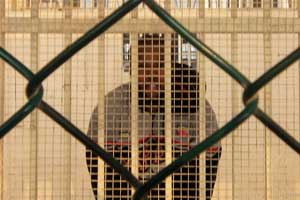
Front page photo of Gulet Mohamed by Mohed Mohamed. Story art by Sarah Baumann.
That was quick.
On Tuesday morning, the lawyer for Gulet Mohamed, an American teen who has been detained in Kuwait for a month, filed suit against the US government, claiming that by placing Mohamed on the no-fly list based only on suspicion, the government is denying him the most basic right of citizenship—the right to live in America. Just over an hour after the papers were filed, a federal district judge in Alexandria, Virginia ordered an emergency hearing. By mid-afternoon, Justice Department lawyers were in court, telling the judge that Mohamed would be on his way back to the States in short order.
The judge has asked for an update on the case on Thursday and appears ready to order the government to bring Mohamed back to the US if he is not home by then, the 19-year-old’s lawyer, Gadeir Abbas, tells Mother Jones. Abbas thinks the government will do what it told the judge it’s working on and bring Mohamed back.
The extremely unusual fast-tracking of the Mohamed case is a sign of how clear-cut the legal and Constitutional issues involved really are. The judge told lawyers for both sides that the government appears to have committed an obvious breach of Mohamed’s rights. “There’s no such thing as a justification that’s sufficient to exclude a US citizen from the US,” Abbas says. “That’s essentially what the judge said.”
Despite Mohamed’s apparent victory, there is some bad news for civil libertarians in the government’s move. Abbas believes the government’s cave-in is a deliberate tactic to maintain its ability to continue to treat others Muslim Americans the same way it has treated Mohamed. Like a number of other Muslim Americans, Mohamed claims he was subjected to what civil liberties groups refer to as “proxy detention.”
Mohamed says he was arrested by a US-friendly Arab nation (in this case Kuwait), beaten and abused by unknown tormentors, and then aggressively interrogated by FBI agents. He asserts that he was repeatedly asked about his travels to countries including Yemen and Somalia, two hotbeds of anti-American activity. He also says he was told he could not return home unless he cooperated with their questioning. All of these claims track with the stories other Muslim Americans have told about their “proxy detention” experiences. “The reason I fully expect the government to have Gulet on a plane back by Thursday is that they want to continue this objecitonable, immoral, and patently unconstitutional practice [of ‘proxy detention’],” Abbas says.
There’s a chance, of course, that the government is bluffing. Mohamed has seemed close to coming home before. On Sunday night, Kuwaiti deportation officials took Mohamed to the airport and tried to put him on a United Airlines flight, but he was not allowed to board. Will this be another similar disappointment for Mohamed’s family? We’ll know on Thursday.











